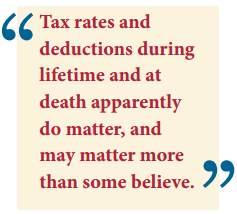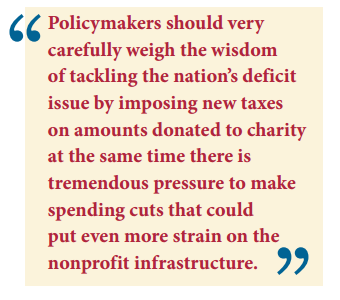In a recently released report, “The 2012 Bank of America Study of High Net Worth Philanthropy,” researchers asked wealthy philanthropists how certain proposed and scheduled changes to tax laws may impact their charitable giving. The results indicate that changes to income and estate tax laws could significantly affect the amount donors give during lifetime and at death.
When asked whether elimination of the charitable deduction for current gifts would affect the amount they give, 49.9 percent said their giving would remain the same. On the other hand, 48.5 percent said they would decrease their giving under those circumstances. Of those, 20 percent said their giving would dramatically decrease.
While some have predicted that an elimination of the charitable deduction would have a negligible effect on charitable giving, the Bank of America study seems to indicate that about half of higher income donors would reduce their charitable giving if they were suddenly required to make gifts from after-tax rather than pre-tax income.
A matter of math
Let’s examine the dollars and cents impact of the elimination of the charitable income tax deduction. If a donor makes a deductible gift of $10,000, $10,000 worth of pre-tax income is needed to make that gift, regardless of the donor’s tax rate. The actual cost of the gift, however, depends on the donor’s marginal tax rate.
income tax deduction. If a donor makes a deductible gift of $10,000, $10,000 worth of pre-tax income is needed to make that gift, regardless of the donor’s tax rate. The actual cost of the gift, however, depends on the donor’s marginal tax rate.
A donor in the 35 percent tax bracket would owe $3,500 in tax on the $10,000 if it were not donated. In a 40 percent bracket, the same donor would owe $4,000 in tax. If the donor makes a charitable gift of the $10,000, he does not have to pay the tax that would otherwise be due. The after-tax cost of the gift would be only $6,500 for the donor in the 35 percent bracket or $6,000 in the 40 percent bracket. Those are the amounts the donor would keep if no gift were made.
If, on the other hand, the tax deduction for donated income is eliminated, charitable gifts would have to be made from after-tax dollars. A donor in the 35 percent bracket would then need income of $15,385 to make the same $10,000 gift after paying $5,385 in tax. The elimination of the charitable income tax deduction for gifts would thus result in a 54 percent increase in the pre-tax income required to make the gift!
When considered from this perspective, it is not difficult to understand why an affluent donor might reduce the amount given to charity. In order to keep the amount of income earmarked for charitable gifts the same, the donor would have to give less. He or she would need to reduce the size of the gift from $10,000 to $6,500, the amount that would be left after paying $3,500 in taxes on the pre-tax income.
Impact on donors
Experienced fundraisers have no doubt encountered a donor who declines to make a gift because he or she has already reached the percentage of adjusted gross income (AgI) limit on the amount that can be deducted during the current tax period. Any additional gifts would have to be made from after-tax dollars. The proposed elimination of the charitable gift tax deduction would simply universalize that result.

If tax increases take place in 2013 as scheduled, one could argue that charitable giving will be negatively impacted as taxpayers spend, save or give away less discretionary after-tax income. If tax rates increase and the charitable income tax deduction is limited or eliminated, a more serious impact might well be expected as discretionary dollars are reduced at the same time donors are required to make charitable gifts from either fully or partially taxed income.
The stakes could be high
In light of this analysis, those involved in the process of seeking voluntary expenditures for charitable purposes should closely follow Congressional debates about if, and/or how much, deductions for charitable gifts should be reduced.
According to Giving USA, individuals gave $216 billion to charity in 2010. The IRS reported that those who itemize gave $170 billion of that amount, or 79 percent of the amount donated by living individuals. It is easy to understand—given the math outlined above—why nearly half of high net worth individuals say they would reduce their gifts if they suddenly had to make them from after-tax dollars.
If a loss of the charitable deduction caused people who itemize deductions to reduce their giving by just 20 percent, that would mean a $34 billion drop in charitable giving, by far the largest decrease since the great Depression.
To put that in perspective, $34 billion is nearly three and one half times the $9.8 billion individuals donated to higher education in fiscal 2011, according to the Council for Aid to education.
The nonprofit sector reportedly employs 10 percent of the U.S. workforce, some 13.5 million people. By comparison, the auto industry accounts for 2 to 3 million jobs. If nonprofits suddenly had to reduce costs by $34 billion, they could well be expected to lay off staff. To absorb all the reduced giving in this way, they would need to eliminate 5 percent of staff, or 680,000 jobs (assuming average salaries of $50,000). That would increase the unemployment rate from 7.9 to 8.4 percent.
Policymakers should very carefully weigh the wisdom of tackling the nation’s deficit issue by imposing new taxes on amounts donated to charity at the same time there is tremendous pressure to make spending cuts that could put even more strain on the nonprofit infrastructure.
Til death do us part
The Bank of America study also sheds light on what could be expected from changes in estate and gift tax policy. Over the past decade, these tax rates have fallen and the amounts subject to tax have been decreased. And there continue to be calls for the complete elimination of the federal “death tax.”
The estate tax is now scheduled to increase dramatically on Jan. 1 if Congress fails to act. If that occurs, the $1 million tax threshold and the 55 percent maximum rate under 2001 law will return as part of the expiration of the Bush tax cuts.
In light of what will undoubtedly be a vociferous debate over the future of the federal estate tax, the response to another of the questions in the Bank of America study is of interest.
Traditional wisdom contradicted
When asked what effect elimination of the federal estate tax would have on their plans to make gifts from their estates, only 5 percent of respondents said that it would cause them to reduce these gifts. Just under 58 percent said their plans would remain the same, while 37 percent said they would increase the amount they would leave to charity from their estates. These findings seem to contradict traditional wisdom that an elimination of estate taxes would lead to reduced giving at death. What are these respondents thinking?
Suppose a donor has an estate of $10 million and a 50 percent estate tax would apply to amounts not left for charitable purposes. As there have been no serious proposals to eliminate the estate tax charitable deduction, we will assume those amounts would remain deductible from the otherwise taxable estate. If the owner of the $10 million estate left $1 million to charity and the remainder to family, the charity would receive $1 million and the family would receive $4.5 million after payment of 50 percent tax on the $9 million taxable estate.
Assume now that the estate tax is eliminated. The charity would receive $1 million and the family, $9 million. Why would a rational person reduce the charitable gifts in his estate under those circumstances? In fact, in that situation, the charitable bequest could actually be doubled to $2 million and the family would receive $8 million, still nearly twice the $4.5 million they would have received if their portion had been taxable.
Time to act
While it is anyone’s guess what direction lawmakers will take on policies affecting charitable giving, it is clear from surveys of the wealthy that taxes are not the primary motivation for making charitable gifts, but are inextricably linked to the amount and timing of those gifts.
If, as some have proposed, both the charitable income tax deduction and the estate tax were to be eliminated, the Bank of America study indicates we could expect a decrease in lifetime giving by the wealthy with more gifts directed from their estates at death.
If the charitable income tax deduction is retained and estate taxes are kept at their relatively low current levels, we might expect little impact on current giving while somewhat greater assets would be devoted for charitable purposes at death than during times of higher estate taxes.
Tax rates and deductions during lifetime and at death apparently do matter, and may matter more than some believe. For those who believe the budget crisis should not be solved by imposing new taxes on amounts given to charity, now is the time to act. Time is short and the stakes may be high.

